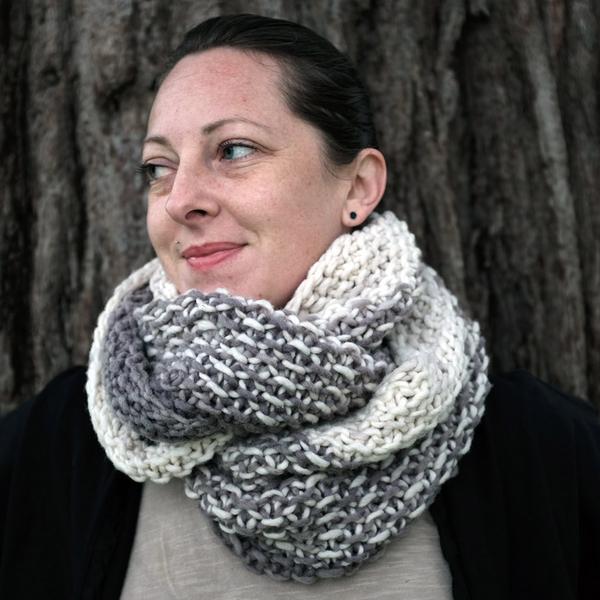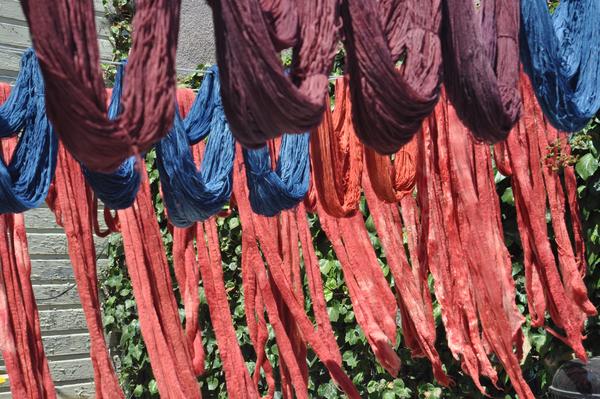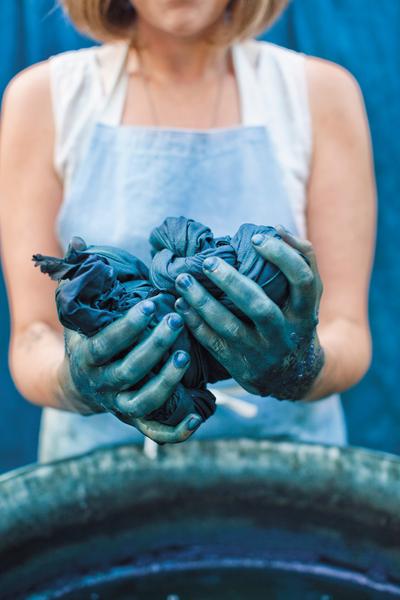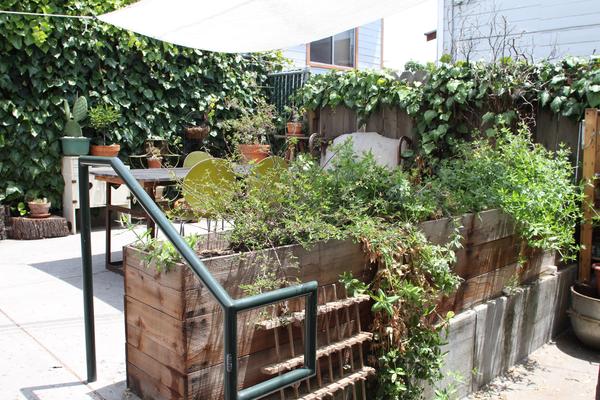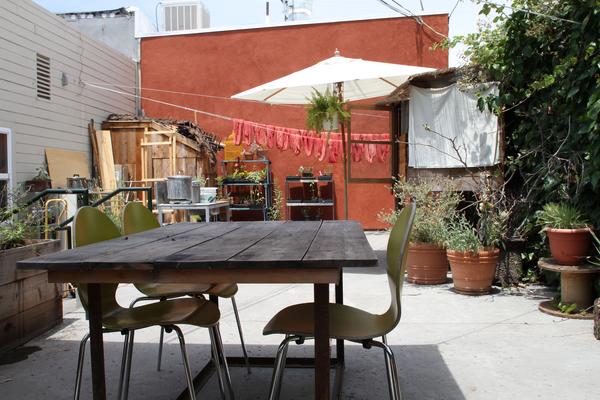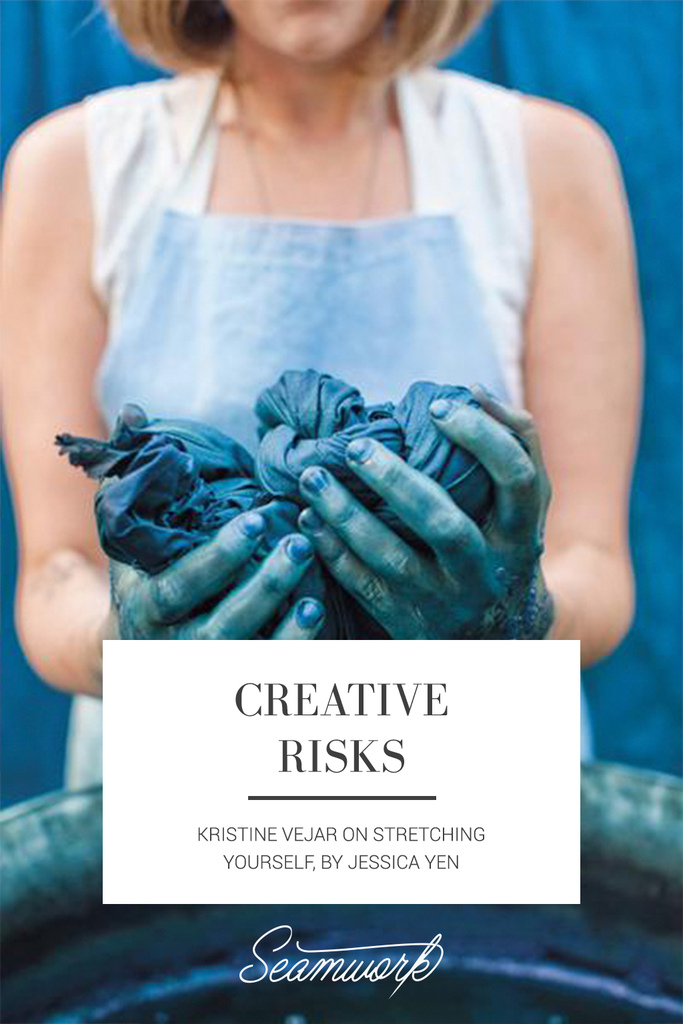Kristine Vejar is the founder and owner of A Verb for Keeping Warm, a 1,700 square foot space in Oakland, CA that includes a shop selling yarn, fiber, and fabric, two classrooms, two dye studios, and a natural dye garden. Kristine first started out naturally dyeing yarn in her kitchen. As her business expanded, she first moved into a small studio, and then opened up a commercial storefront in 2010. Along the way, she’s expanded into a number of creative spaces. The store doesn’t just sell yarn, it sells yarn and fiber and fabric. They don’t just dye yarn, they collaborate with local growers to create unique, locally-grown, locally-dyed yarns.
Verb, as she calls it, is one of those rare businesses that seems to thrive on variety. Any creative venture requires creative risks, and one with this many pots simmering could only be built on a succession of them. Kristine was kind enough to share her thoughts on the biggest risks she’s taken, how she’s handled them, and what she’s learned.
Have you always wanted to own a small business?
At one point I just wanted to travel for the rest of my life and look at stuff and never have a house. But having a vision and seeing it fulfilled is motivational and inspiring. Plus, I really love textiles. There's still so much for me to learn. If I have this platform to be able to learn, then I'm going to keep working at it.
What has it been like owning a business?
Having a business is an amazing experience. I think it's an amazing way to interface in society, and you’re very, very alive. It's not always easy or fun, but it's challenging in a really great way, and you really feel like you're participating.
You should always be a little uncomfortable. You’ll feel like, “Oh wow, this was a really big bite to chew.” Then you acclimate or you trust that you have built a support system, and you keep going. Owning a business means constantly having an area to stretch yourself and to expand.
What was your greatest creative risk?
Opening up the Verb storefront. That was a huge risk.
What are some ways you’ve learned handle these risks? What advice do you have for others?
I’ve tried to minimize my risks where I can. When I first started out and went to rent my studio (before we opened a storefront), I was really scared but I tried to create a situation where I didn't have a lot to lose. For instance, I rented a studio space that included all of my utilities and had no lease. So in three months, if things weren't working, I could leave and I didn’t have to worry about being stuck in a lease or closing utilities accounts. It was definitely a greater amount of money per square foot. But it gave me that flexibility and it was a smaller financial step.
Also, the studio wasn't on a main street. It was a closed studio that I had ultimate access to. Only the tried and true, hardcore people who loved hidden gems were going to seek me out. So that felt safer, too.
I can be shy and I can be thin-skinned around criticism and judgment. When we decided to open up our storefront, we moved onto one of the largest streets in the Bay Area. I wasn't going to be able to control who could enter or exit the space and their feelings about the space. Also, I needed a lot of people to help me run this space, which meant being responsible for their salaries and learning how to cultivate staff. Both of those coming at the same time was a pretty big shock.
What are some lessons you took from that experience?
It’s so important to have patience and trust you will find your people. This includes finding and cultivating staff who understand your mission, have your back, are great with customers, and work well together.
It’s also been important to recognize we can't be everything to everyone. Even when we try our best and are receptive to people, we are not going to be able to please everybody, and I had to learn that I'm not a failure for that. That lesson was really hard and still can be.
Were you always interested in creating locally-grown yarn?
The idea of local fiber production has always been on my mind. The actual execution has been much more entailed and complex. While we now have several lines of California-grown yarn that we naturally dye in our studio, our initial yarns that were not made with California-grown wool.
Then Fibershed, a local non-profit, started having their fiber symposiums, which brought together people and businesses from across the local fiber production spectrum. That is when all the stars aligned and I was ready to take the plunge and try something. One issue was that the startup cost was thousands of dollars. That was definitely a shady road, it was hard to see the path and it was so much money to invest.
Simultaneously, our staff was building and becoming more stable. So I had people who were behind me. We decided, “Okay, let's all do this as a team, we're all going to make this work and we're all here.” What a huge shift.
What has been important for your business?
One of the most important things in my business, for me personally, has been cultivating jobs and the staff. It hasn’t necessarily been one of my strengths. I’m very independent when I work. To be able to lead and cultivate relationships has been hugely important. It takes a lot of time. Humans in general take a lot of time, including me. It takes time to get to know someone.
At this point, I feel really confident in my ability to create a team and work with that team. And I feel confident that we can accomplish more things working like a team.
What advice do you have for someone who is thinking of starting a craft business?
I think with business, one of the biggest things is patience and perseverance. You have this vision and you keep trying to sculpt it. It's like sculpting a large rock. Sometimes you can't finish your sculpture but other times you can, you just have to go slowly. Luckily, there's been all these different people and companies who have gathered to cultivate this handcrafted movement and slow fashion. It's coming from so many different angles and different sides.
